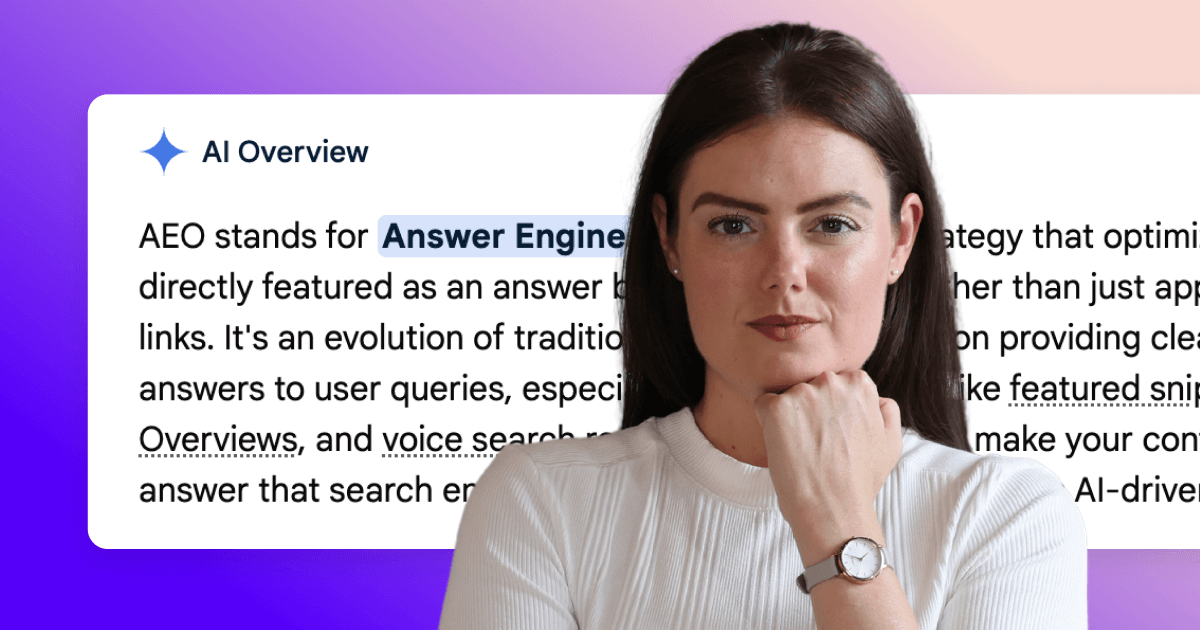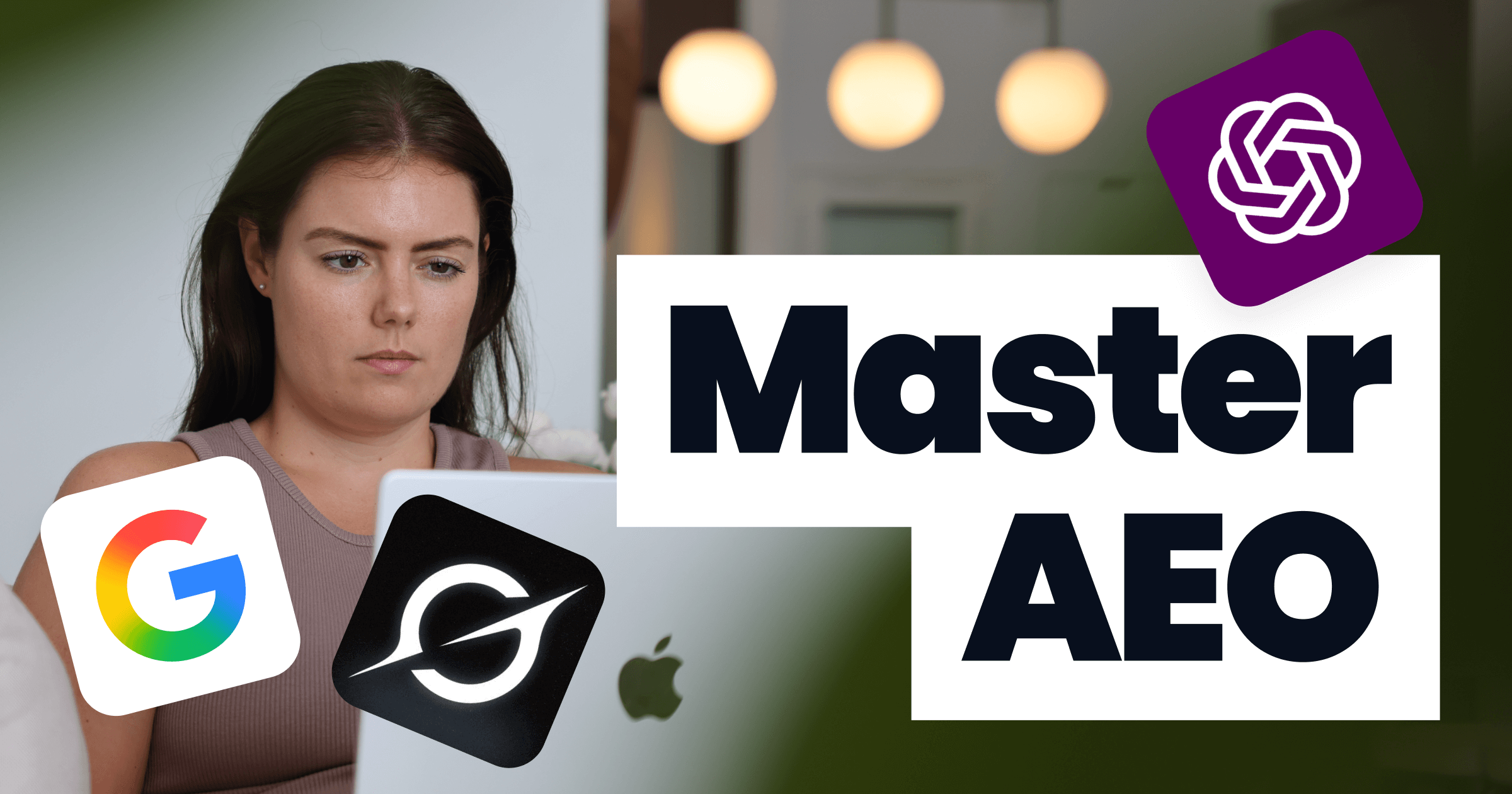
In November 2022, OpenAI launched ChatGPT to the public, reaching 100 million users in just 59 days - the fastest adoption in consumer tech history.
In May 2023, Google introduced Bard (now Gemini) to 1.8 billion monthly users, signaling the end of link-only search results.
In June 2024, Google expanded AI Overviews to 47% of U.S. search results, triggering a 3% year-over-year surge in zero-click completions.
In July 2025, xAI unveiled Grok 4, achieving a record-breaking 95% on the AIME math benchmark and saturating GPQA Diamond with 88%, outpacing rivals like GPT-5 and Claude 4 in scientific reasoning.
This pace is relentless!
AI search volume now doubles every 12 months, with enterprise-grade queries growing 180% year-over-year as executives bypass traditional engines for instant, synthesized AI generated answers.
Global information demand has exploded - users fire off 8.5 billion daily searches, 40% of which expect conversational depth within seconds, and adoption curves have flattened the S-curve entirely; what once took years now takes weeks.
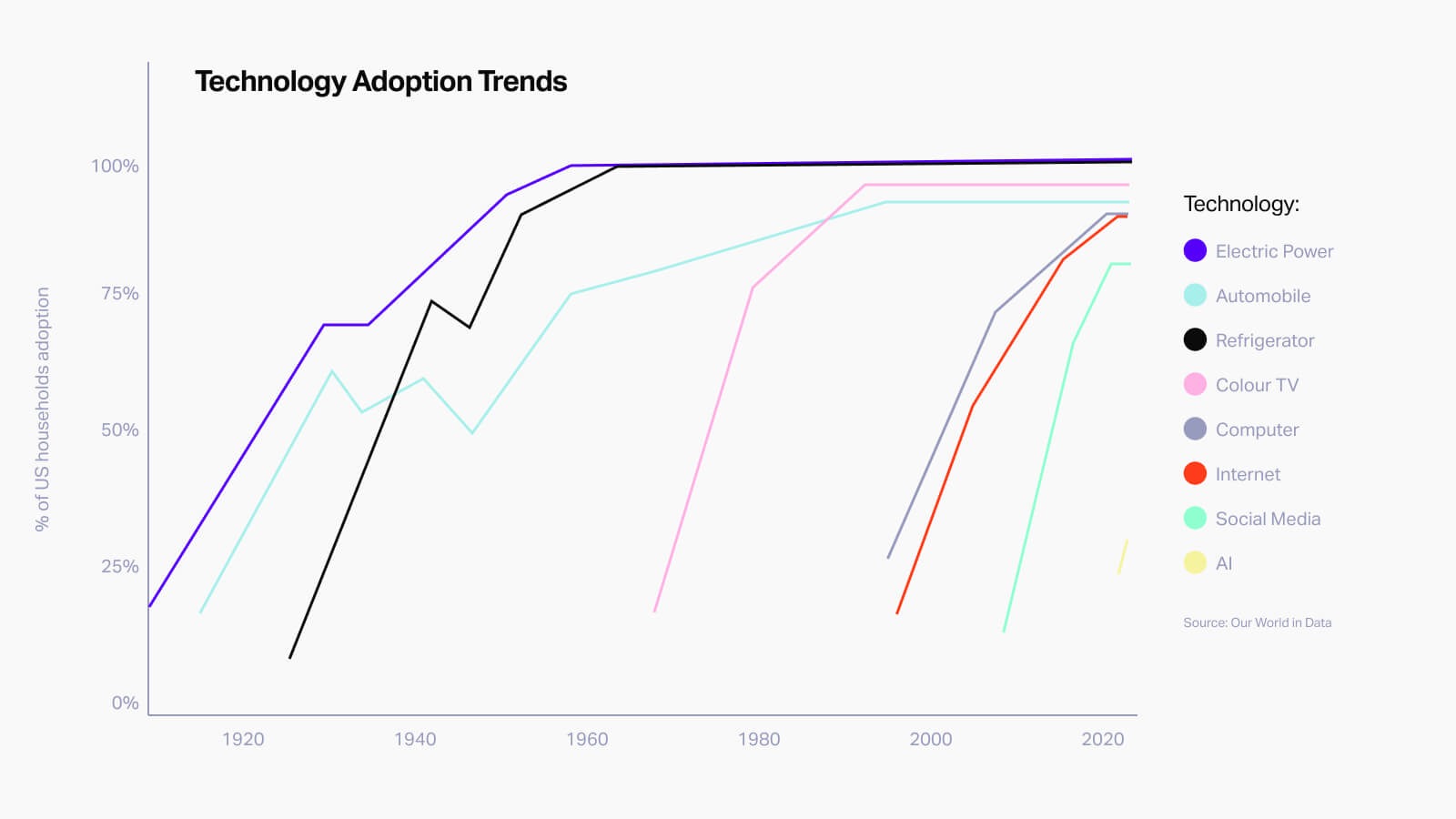
We no longer compete with search engines - we compete with answer engines.
The winners aren’t the fastest click-funnels or the highest-ranking pages. They’re the sources AI trusts to quote verbatim.
This is Answer Engine Optimization (AEO): the disciplined practice of structuring expertise so precisely that Grok, Gemini, Copilot, ChatGPT and Perplexity cite you as the authority.
This guide is for international enterprises that publish whitepapers, run research teams, and shape industries. You’ll learn:
- Exactly what AEO is (and why “AI Engine Optimization” is a misnomer)
- How it diverges from traditional SEO
- Seven scalable tactics to dominate AI answers in 2025
- Tools, metrics, and future-proof trends
No hype. Just the framework to turn your institutional knowledge into AI-native authority.
Let’s begin.
What is Answer Engine Optimization (AEO)?
The digital landscape has transformed dramatically since the early days of search engines like Google in the late 1990s. Back then, searches were rigid: type in keywords, scan blue links, and click through to sites.
Fast-forward to today, and AI-powered tools are redefining discovery. Platforms like ChatGPT (from OpenAI), Google AI Overviews, Perplexity AI, and Microsoft Copilot don't just index pages—they understand context, synthesize information, and deliver conversational answers.
This shift has given rise to Answer Engine Optimization (AEO), a discipline aimed at positioning your content as the authoritative source in these AI responses.
At its core, AEO is about optimizing for "answer engines"—AI systems that prioritize direct, helpful replies over traditional rankings.
The goal?
Get your content cited or featured prominently, often in zero-click scenarios where users satisfy their query without visiting your site. For instance, if someone asks Google for a “3 day London itinerary”, AEO ensures your travel blog is quoted verbatim, or summarized easily, building your brand's credibility instantly.
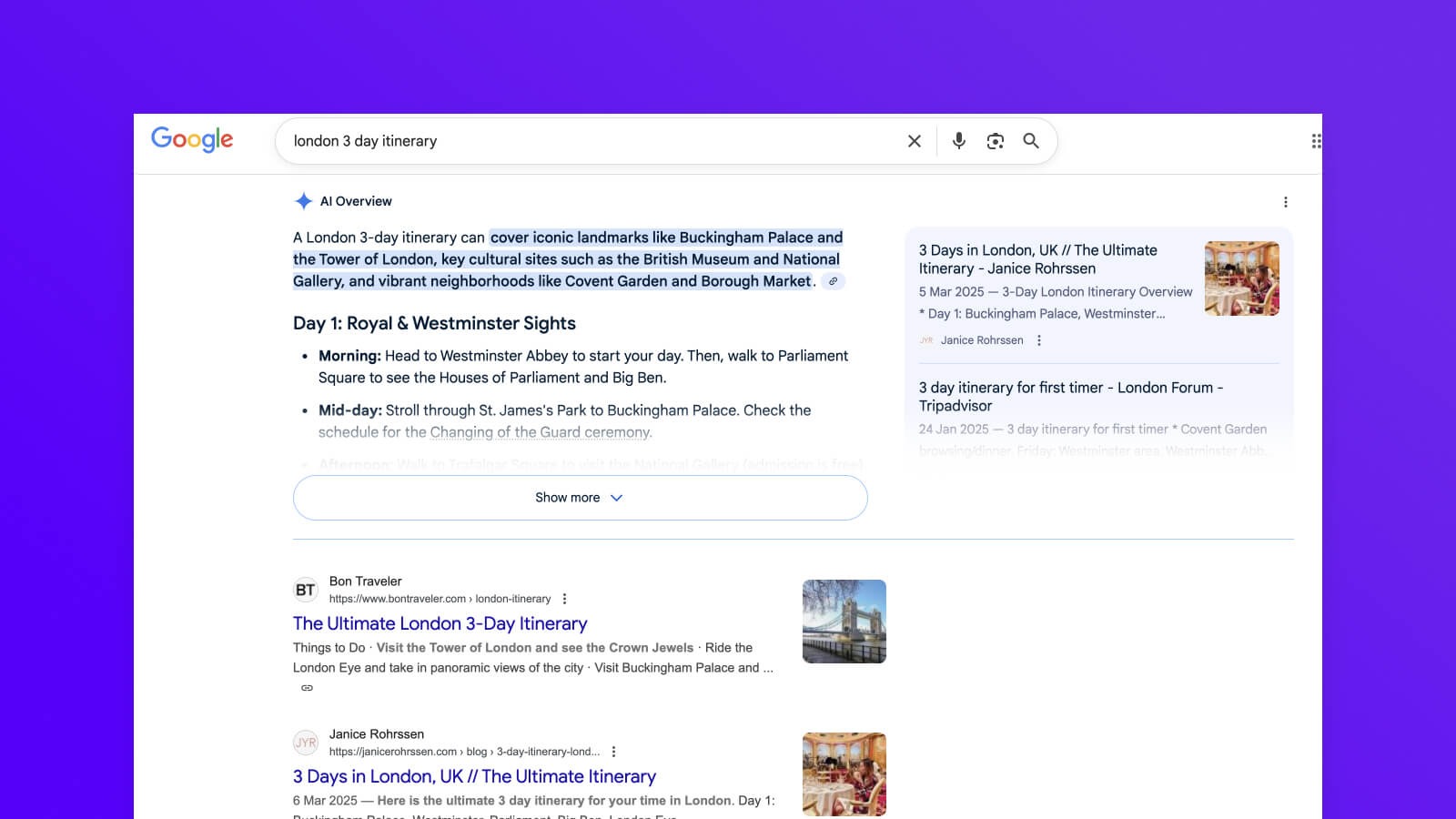
How does this work in practice?
AI engines use natural language processing (NLP) and large language models (LLMs) to crawl, analyze, and remix content from trusted sources. They favor pieces that are structured, factual, and aligned with user intent.
Getting featured isn't about gaming algorithms with backlinks; it's about creating content that's inherently answer-worthy—clear, expert-backed, and scannable.
Consider a real-world example: A global pharmaceutical company publishes a detailed report on drug supply chain disruptions. Through AEO, this report gets cited in LLM answers to user queries like "How to mitigate global supply chain risks in pharma?"
The result?
Enhanced authority without direct traffic, leading to partnerships or media mentions down the line. With nearly 60% of Google searches ending without a click in 2024, this evolution underscores a broader trend: users crave efficiency.
The Rise of AEO
AEO isn't optional—it's essential for maintaining relevance in a conversational search world.
Data shows that the percentage of all queries currently triggering an AI Overview are rapidly increasing in 2025:
- AI Overviews were triggered for 6.49% of queries in January
- That climbed to 7.64% in February (an 18% increase)
- And then up to 13.14% by March (72% growth from the previous month)
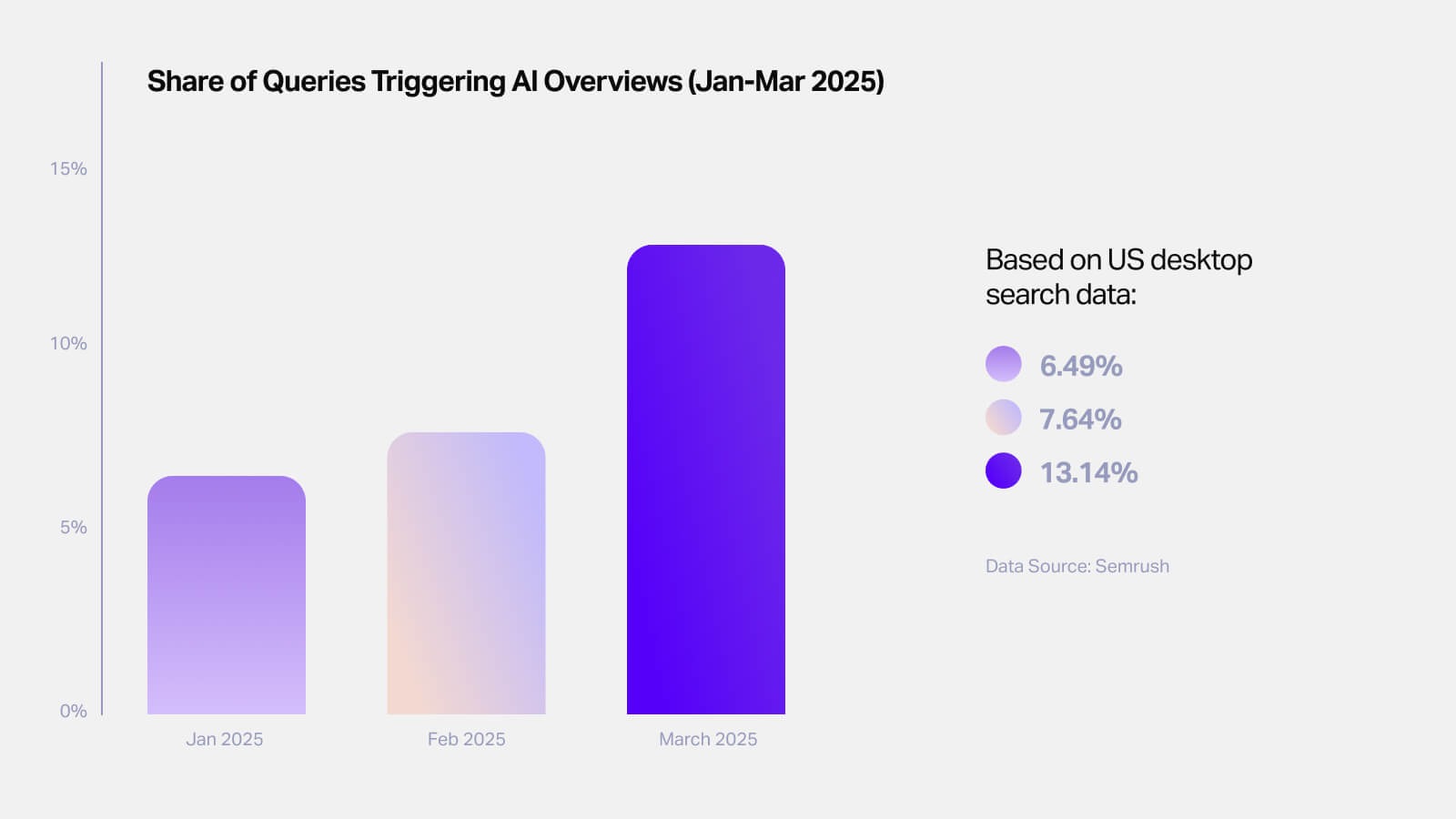
In May 2025, AI Overviews showed up for around 54.61% of all Google searches!
Key Players in the AEO World
- ChatGPT: For open-ended queries.
- Google AI Overviews: Integrated into 47% of searches.
- Perplexity AI: Research-focused answers.
- Microsoft Copilot: Enterprise productivity tool.
- Grok:
Why AEO Matters in 2025
By 2025, AI will be ubiquitous in how we seek information, especially among younger demographics. Over 60% of Millennials and Gen Z already turn to AI engines regularly for everything from career advice to business strategies.
These users favor instant, synthesized answers over sifting through links. For complex queries like "How to navigate EU GDPR updates for multinational operations?", they expect a concise summary drawn from experts—not a list of articles they have to read.
The rise of zero-click searches amplifies this; these are queries resolved directly on the search platform, without clicks to external sites.
Data from Ahrefs shows a 3% annual increase, with AI Overviews appearing in up to 55% of Google searches. For international companies, this means traditional traffic funnels are shrinking. If your whitepaper on sustainable global sourcing isn't cited in AI responses, you're invisible to decision-makers querying from boardrooms in New York or Singapore.

But the benefits extend beyond visibility.
AEO fosters long-term brand equity. When your content is featured, it positions your organization as a thought leader, building trust and authority. Indirectly, this drives traffic: users intrigued by a citation may seek your full resources.
Take a hypothetical case study: A European fintech giant optimized its blog for AEO by structuring posts around executive-level questions. Within six months, AI citations boosted their mention in industry reports by 35%, leading to increased investor interest and partnerships.
Ignoring AEO carries risks, too.
Competitors who adapt will dominate narratives in high-stakes industries like finance, tech, and manufacturing. For example, in e-commerce, brands like Amazon already leverage AEO to appear in AI shopping advice, edging out smaller internationals.
“By 2026, traditional search engine volume will drop 25%, with search marketing losing market share to AI chatbots and other virtual agents, according to Gartner, Inc.” - Source
Ultimately, AEO matters because it aligns with how knowledge is consumed globally—fast, accurate, and context-aware. In a world where AI handles cross-border queries seamlessly, optimizing for answers ensures your enterprise stays competitive.
To harness AEO, it's crucial to understand how it diverges from the SEO strategies you've relied on.
AEO vs SEO: Key Differences Between AI Engines & Traditional Search
Search Engine Optimization (SEO) has long been the cornerstone of digital visibility, focusing on climbing SERP rankings to attract clicks and traffic. AEO, however, flips the script: it's about being the answer, not just the link. While both aim to improve discoverability, their tactics and outcomes differ fundamentally.
Here's a detailed comparison:
Primary Goal
SEO: Rank high in SERPs for clicks and traffic
AEO: Appear as cited answers in AI summaries and featured snippets
Focus
SEO: Keywords, backlinks, site speed
AEO: Structured, question-answering content; E-E-A-T (Experience, Expertise, Authoritativeness, Trustworthiness)
User Intent
SEO: Broad discovery searches
AEO: Long-tail, conversational queries
Metrics
SEO: Click-through rate (CTR), organic traffic
AEO: Citation frequency in AI responses, zero-click visibility
Tools/Formats
SEO: Meta tags, long-form blogs
AEO: Schema markup, FAQs, clear headings, concise snippets
Key takeaways:
- SEO thrives on technical tweaks like optimizing meta descriptions or building link authority to drive visitors.
- AEO, conversely, emphasizes content that AI can easily parse and remix—think direct responses to questions, backed by E-E-A-T signals. For instance, Google evaluates trustworthiness via author credentials and source citations, which AI engines mirror.
The two aren't rivals; AEO complements SEO by promoting "human-first" content: factual and user-centric over keyword-stuffed pages. Use SEO for broad topics like "cloud computing trends" to capture exploratory traffic, but lean on AEO for specifics like "How to implement zero-trust security in enterprises?" where AI delivers tailored answers.
Now that you see the distinctions, let's explore how to put AEO into action.
How to Show Up in AI Search: 7 AEO Tactics
This section is the actionable heart of AEO—seven tactics drawn from industry best practices, scalable for international enterprises.
Start small: audit one piece of content, then expand. These build on SEO foundations but prioritize AI-friendliness.
- Answer Questions Directly: Frame your content around real user queries using appropriate heading structures. Begin with a concise answer (under 50 words) before diving deeper. This makes AI extraction effortless, increasing citation odds.
- Use Structured Data: Implement schema markup to signal content structure to AI crawlers. Types like FAQPage or HowTo help. Tools like Google's Structured Data Testing Tool validate this. Result? AI pulls your steps directly, as seen in Google AI Overviews.
- Prioritize E-E-A-T: AI favors credible sources, so include author bios (e.g., "Written by Dr. Jane Doe, 20+ years in enterprise tech"), citations from reputable journals, and original data. Avoid generic advice; share unique insights from your company's case studies.
- Optimize for Voice/AI Search Queries: Target natural language phrases like "Best ways to expand into Asian markets ethically." Test by querying ChatGPT with your content—does it cite you? Refine for conversational tone, incorporating synonyms and variations.
- Create at Scale: Build topic clusters: a pillar page on "Enterprise Digital Transformation" linking to sub-pages answering queries like "How to Integrate AI in Global Operations?" This covers query variations, amplifying AEO reach.
- Monitor with Tools: Track performance using AI-specific trackers and set up alerts for when competitors outrank you. Metrics: Aim for 20%+ citation rate in target queries. Integrate with Google Analytics for indirect traffic spikes.
- Avoid Fluff: AI detects and skips keyword-stuffed, low-value content. Focus on authenticity: Use data-backed claims and user stories. Pitfall example: A bloated blog post ranks in SEO but gets ignored by AI; trim to essentials for better results.
💡 Bonus Tip: Combine tactics with a content audit checklist: Review 10 pages for question structure, add schema for structuring content, check E-E-A-T, and test in AI tools. Scale via content teams for global consistency.
Encouraged? Start with Tactic 1 today to see quick wins.
The Future of AEO: Trends and Predictions
Looking ahead, AEO will evolve with AI advancements.
Emerging trends include:
- Personalized responses (AI tailoring answers based on user location or role)
- Multimodal search (incorporating images, videos, and even AR)
However, challenges persist too:
- AI hallucinations, aka fabricated info, could undermine trust (always emphasize verifiable sources)
- Ethical concerns, like bias in citations, require diverse content creation
Answer Engine Optimization (AEO) is the strategy for thriving in AI-powered search: getting cited in direct answers from tools like ChatGPT and Google AI Overviews, but it’s not just about optimization—it's about becoming the go-to voice in global conversations that drive decisions.
Amid rising zero-click trends on search engine results pages, and conversational queries with LLMs, content quality is still the underlying magic to succeed at both traditional SEO and the emerging realm of AEO. Ensuring your content is authentic, human-centric and backed by facts is crucial for AI models to cite you.
To take action, start by auditing your top hit pages, apply one tactic to optimize your content, then track results.
This future demands proactive adaptation. Tie it into your content strategy now, or let us do it for you!
FAQs
What is Answer Engine Optimization (AEO)?
AEO is the practice of structuring content to be directly cited as the authoritative answer in AI tools like Grok 4, Google AI Overviews, Microsoft Copilot, and Perplexity—not just ranked in search results.
How is AEO different from SEO?
SEO drives clicks to your site. AEO earns zero-click citations—your content becomes the answer users see without leaving the AI platform.
Why should enterprises care about AEO in 2025?
Over 40% of executive queries now go through AI assistants. Being cited builds thought leadership, trust, and indirect traffic—even when users don’t click.
Do backlinks still matter for AEO?
Less than in SEO. E-E-A-T (Experience, Expertise, Authoritativeness, Trustworthiness) and structured, question-focused content outweigh link volume in AI citation decisions.
Can AEO work for B2B and enterprise brands?
Yes—especially for whitepapers, frameworks, and research. AI tools favor original data, expert authorship, and clear methodology—all strengths of enterprise content.
What percentage of Google searches trigger AI Overviews in 2025?
As of March 2025, 13.14% of all U.S. desktop queries trigger AI Overviews—up from 6.49% in January (Semrush data). Expect this to exceed 20% globally by Q4.
Are AI Overviews increasing zero-click searches?
Not necessarily. Keywords with AI Overviews have higher baseline zero-click rates due to informational intent, but same-keyword analysis shows zero-click rates slightly declined (38.1% → 36.2%) after AI Overviews appeared (Datos + Semrush).
Which industries are most impacted by AI Overviews?
In 2025, Science (+22.27%), Health (+20.33%), People & Society (+18.83%), and Law & Government (+15.18%) lead in AI Overview share growth. These high-trust sectors are AI’s first battleground.
Do AI Overviews hurt organic traffic for enterprise brands?
Only if you're not cited. Brands included in the AI summary see indirect traffic spikes from navigational follow-ups. The real risk: being omitted while competitors are quoted.
What types of queries trigger AI Overviews?
88.1% are informational, long-tail, low-CPC, and low-difficulty. Examples: “What is BMR?”, “difference between debit and credit”. Commercial/transactional queries are rising but still under 10%.
Is AEO replacing SEO in 2025?
No—AEO extends SEO. Rankings still drive discovery. But citation in AI answers is the new authority signal. Optimize for both: rank high and be the source AI quotes.

Just a heads up, some of the links in this article may be affiliate links, meaning we may make a small commission on any sign-ups or purchases for the tools we recommend.




